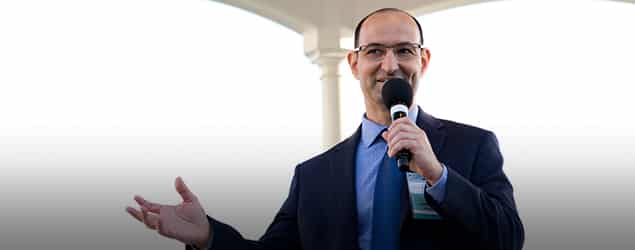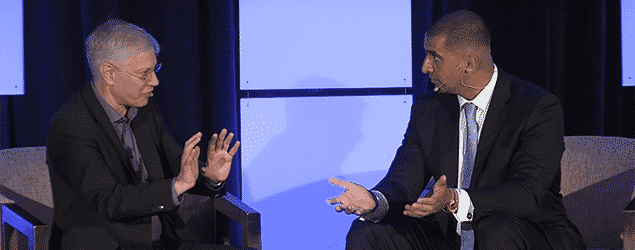#OCON2017 Meet Steve Simpson

Steve Simpson, constitutional lawyer and director of Legal Studies at the Ayn Rand Institute, will be speaking at Objectivist Summer Conference 2017 in Pittsburgh, Pennsylvania.
This year, Simpson will give a talk titled “Wealth Creators: The Forgotten Victims of Cronyism.” Said Simpson: “Basically, I’m going to look at cronyism from the standpoint of the good guys, not the bad guys.” Most discussions of cronyism focus on businesses that benefit from favors bestowed by government, he observed, but the wealth creators who are plundered in the process are ignored. And he continued: “Ayn Rand is the only one who talks about the nature of cronyism from the standpoint of its victims — the productive people whose wealth is stolen.”
Simpson will also take part in a panel on free speech with Flemming Rose, author of The Tyranny of Silence: How One Cartoon Ignited a Global Debate on the Future of Free Speech and former editor at the Danish newspaper Jyllands-Posten, and Dave Rubin, creator and host of The Rubin Report. “It’s inspiring to sit on a panel with people like Flemming Rose, who have literally put their lives on the line defending the right to free speech,” said Simpson, who has participated in a number of such panels on campuses throughout the United States this year (see here, here, here and here).
He’s also looking forward to meeting students new to Objectivism at the conference. Last year, 120 students attended OCON and this year more than a hundred have already registered. “I love that we are engaging more students,” Simpson said.
We caught up with Steve Simpson to ask him about career, life and law.
What’s your background?
Twenty years as a lawyer, thirteen of those as a constitutional lawyer litigating free speech cases. And now I’m at ARI, writing and speaking about many of the issues I used to litigate.
Great speaking moment?
It was definitely the first case I argued at the Institute for Justice. I was challenging as a violation of the First Amendment laws that restricted online advertising. The judge was totally against me and wanted to dismiss the case. I convinced him not to and went on to win the case.
What inspired your work on free speech?
Well, I like to talk, so that’s no doubt part of the reason. But I’ve always been interested in free speech as a legal and moral issue. In law school, I wrote a law review article on it and then later focused on it in my legal career. I have a viscerally negative reaction to anyone who wants to control what others may think and say, even when the ideas they want to ban are obviously wrong or evil. Free speech is absolutely essential to a free society. Any effort to shut it down can only cause conflict and destruction.
What did you learn from someone you disagree with?
Through my experience in campaign finance litigation, I gained much greater appreciation for why people oppose “money in politics.” Many of them are focusing on a real evil, which is cronyism and government corruption, but they don’t understand the cause or the solution. Paying more attention to them has made me much better at arguing against laws that can seem sensible or, at least, the only alternative to a corrupt government.
How do you cure creative block?
Often I start by beating my head on my desk. Once I get past that phase, I try to do something sensible, so here’s the real approach: I write at the top of a blank sheet of paper “What am I trying to say?” Then I answer it. When I’m done, I usually discover that I don’t know what I’m trying to say, in which case I need to figure it out. Or I don’t know enough to say it, in which case I need to do more research. Or I have the beginnings of a nice summary of whatever it is I was trying to write.
Favorite Ayn Rand character and why?
Hank Rearden for his love of work. I’ve had many moments in my career when I could relate to the scene in Atlas after he pours the first heat of Rearden Metal and is reflecting on what it took to get there.
Best OCON moment?
There are two. The first is Leonard Peikoff’s 2010 DIM talk in Las Vegas. It was eye-opening, and I thought about it for weeks afterward. It really drove home the fact that culture is heading in the wrong direction. Second is Onkar Ghate’s talk last year titled “Objectivist Movement 2.0,” and the Q&A he and Yaron Brook did on the subject. Self-reflection is important. Movements need it just as much as individuals.
Before I go in front of an audience . . .
I try to put myself in the moment, as clichéd as that sounds. I focus on the details of being there and pay conscious attention to what’s happening around me. Every time you get on stage, it needs to be fresh and real. If you’re too focused on prep, you forget that there are people in the audience to connect with.
How did you come to ARI?
I had been speaking with Yaron for a few years about the possibility of joining ARI. By about 2012, I was getting a bit burned out with law and wanted to do more intellectual writing. At about the same time, my family decided they all wanted to live in California, so that seemed like a good time to make the leap.
What advice would you give your 20-year-old self?
There is joy in hard work, and take more risks. When you are young, you can do so much more than you realize.
What three things are you currently loving?
- Intellectual history. I’m strangely having some fun figuring out the post-modernists and the other intellectual currents that have led to attacks on free speech. The history of philosophy is important for a lot of reasons, but seeing how ideas evolve (even bad ones) is fascinating.
- Hiking and motorcycling (although not necessarily together). I recently did an eleven-mile hike near Mount Baldy in Southern California with a friend. We were 9,000 feet up and there was snow in late April! I came down exhausted, but invigorated. And there’s nothing quite like exploring a state like California on a motorcycle.
- Watching my kids getting older. It’s delightful (even though it is sometimes also terrifying) to see them turning into adults.
Objectivist Summer Conference 2017 will take place in Pittsburgh, Pennsylvania, June 10–15. You can find out more and register here.



